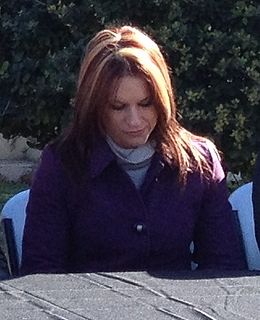A Quote by Atom Egoyan
I'm obsessed with this idea of storytellers and people who have a narrative, and sometimes sustain a relationship because they're telling a narrative and someone is listening to that. Often the nature of the relationship is determined by how well they tell the story, or someone else's ability to suspend disbelief, or infuse into their narrative something which they may not even be aware of.
Related Quotes
Living "in" a story, being part of a narrative, is much more satisfying than living without one. I don't always know what narrative it is, because I'm living my life and not always reflecting on it, but as I edit these pages I am aware that I have an urge to see my sometimes random wandering as having a plot, a purpose guided by some underlying story.
The ability to walk in someone else's shoes, or in my case, play down in someone else's cleats is one of the very best things you can do. There's nobody in this world who doesn't have that voice in their head. Sometimes it's the best voice in the world, and it pumps you up, but sometimes the voice is down. I wanted my players to be able to hear my voice in their head instead of someone else's because I knew that was a narrative I could control.
I just thought someone has to figure out how to break through that barrier and create a narrative for a black super hero story to unfold at the same scale as something like Star Wars. Rythm Mastr is about producing a narrative of a hero engaged in a struggle as complicated as those other stories. The catalyst for it was the beginning of the demolition of public housing in Chicago.
I have a theory that, for people of color or others who have been cut out of the master narrative, just telling your personal survival tale, your story, is civic engagement. It is a kind of political performance and is really crucial in that storytelling is how the writers connect with people and change. It's how we collect and add to and complicate the master narrative.
There's some ambient music that doesn't do anything. I wouldn't say that that's narrative. It is narrative in that it creates a sort of world where nothing happens, where really nothing happens, so you become a different person after hearing eight minutes of exactly the same thing. Yes, I hear music all the time in which one idea is strung together to another idea, and I feel that such music is non-narrative.
I do think the challenge, in a way for me, is to write a narrative film and when you finish watching it you feel like it's a collage. You tell the narrative, you tell the story, but you feel like you've created this tapestry. But it also has a shape, a story. So I think there's a middle ground that I try to strike... away from where everyone else seems ready to go, which is, setup, payoff. You know, He's afraid of water, oh, and at the end he's swimming in water - oh, my God. I hate that stuff.
The close-up has no equivalent in a narrative fashioned of words. Literature is totally lacking in any working method to enable it to isolate a single vastly enlarged detail in which one face comes forward to underline a state of mind or stress the importance of a single detail in comparison with the rest. As a narrative device, the ability to vary the distance between the camera and the object may be a small thing indeed, but it makes for a notable difference between cinema and oral or written narrative, in which the distance between language and image is always the same.
For queer people, the personal is very political, just to talk about it in a public space. It's very political just to come out and take up that space and be like, 'This is my narrative. It's not an outsider narrative, and it's not a fetish narrative; it's just my story, and it's worth being told and listened to.'




































